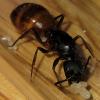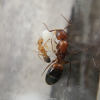- Formiculture.com
- Forums
- Gallery
- Members
- Member Map
- Chat

Ant Queens in twigs?
Started By
NCAntNoob
, May 5 2023 1:00 PM
5 replies to this topic
#1
 Offline
-
Posted May 5 2023 - 1:00 PM
Offline
-
Posted May 5 2023 - 1:00 PM
I have seen a few videos of people finding queen ants inside of twigs and I am wondering what people look for when they try to find ants in twigs. Any advice would be appreciated.
#2
 Offline
-
Posted May 5 2023 - 1:55 PM
Offline
-
Posted May 5 2023 - 1:55 PM
Mainly small holes in them. There's no guarantee until you break it open.
Edited by AntsCali098, May 5 2023 - 2:31 PM.
Interested buying in ants? Feel free to check out my shop!
Feel free to read my journals, like this one.
Wishlist:
Atta sp (wish they were in CA), Crematogaster cerasi, Most Pheidole species
#3
 Offline
-
Posted May 5 2023 - 2:42 PM
Offline
-
Posted May 5 2023 - 2:42 PM
Mainly small holes in them. There's no guarantee until you break it open.
This.
I have found Solenopsis picta, Pheidole navigans, one other tiny species of Pheidole (assuming parva, but not positive) and Pseudomyrmex ejectus queens/colonies in downed twigs/branches.
Like previously stated, look for holes. However, I typically break open any sticks I see on the ground regardless because they don't always enter through the sides, but sometimes on the ends.
- AntsCali098 likes this
#4
 Offline
-
Posted May 5 2023 - 9:00 PM
Offline
-
Posted May 5 2023 - 9:00 PM
Typically wild caught colonies don't fare well. But good luck.
- ANTdrew likes this
“If I am killed for simply living, let death be kinder than man.” -Althea Davis
#5
 Offline
-
Posted May 6 2023 - 2:39 AM
Offline
-
Posted May 6 2023 - 2:39 AM
^This! It is much easier and better to find newly flown queens.Typically wild caught colonies don't fare well. But good luck.
- AntsCali098 likes this
"The ants are a people not strong, yet they prepare their meat in the summer." Prov. 30:25
Keep ordinary ants in extraordinary ways.
Keep ordinary ants in extraordinary ways.
#6
 Offline
-
Posted May 7 2023 - 10:12 AM
Offline
-
Posted May 7 2023 - 10:12 AM
Typically wild caught colonies don't fare well. But good luck.
This seems true from my experience, however I am friends with a lot of people who have found and kept colonies and have had them for years, even to this day. I'd say that there may be some operative errors made in the process as well, which may affect how the colony fares.. however, I do agree that all colonies are finicky and although some may do well, many others may not. If they start in the wild, it's a shock to go to the tube.. if you start in the tube, it can also be a shock to go to the wild. It does not MEAN a death sentence, though.
I highly recommend not doing this to native/less common species, especially if there are many invasive already pushing native species out.
The only colony I have ever tried to keep from the wild was an invasive Pheidole navigans colony collected from a branch on the ground. I gave her a couple majors and a decent amount of minor workers and some brood, and they refused to eat or do anything and eventually died. I wouldn't risk that with a rare/native species, with how many invasive are here in Florida, killing off and displacing native species.
0 user(s) are reading this topic
0 members, 0 guests, 0 anonymous users
















